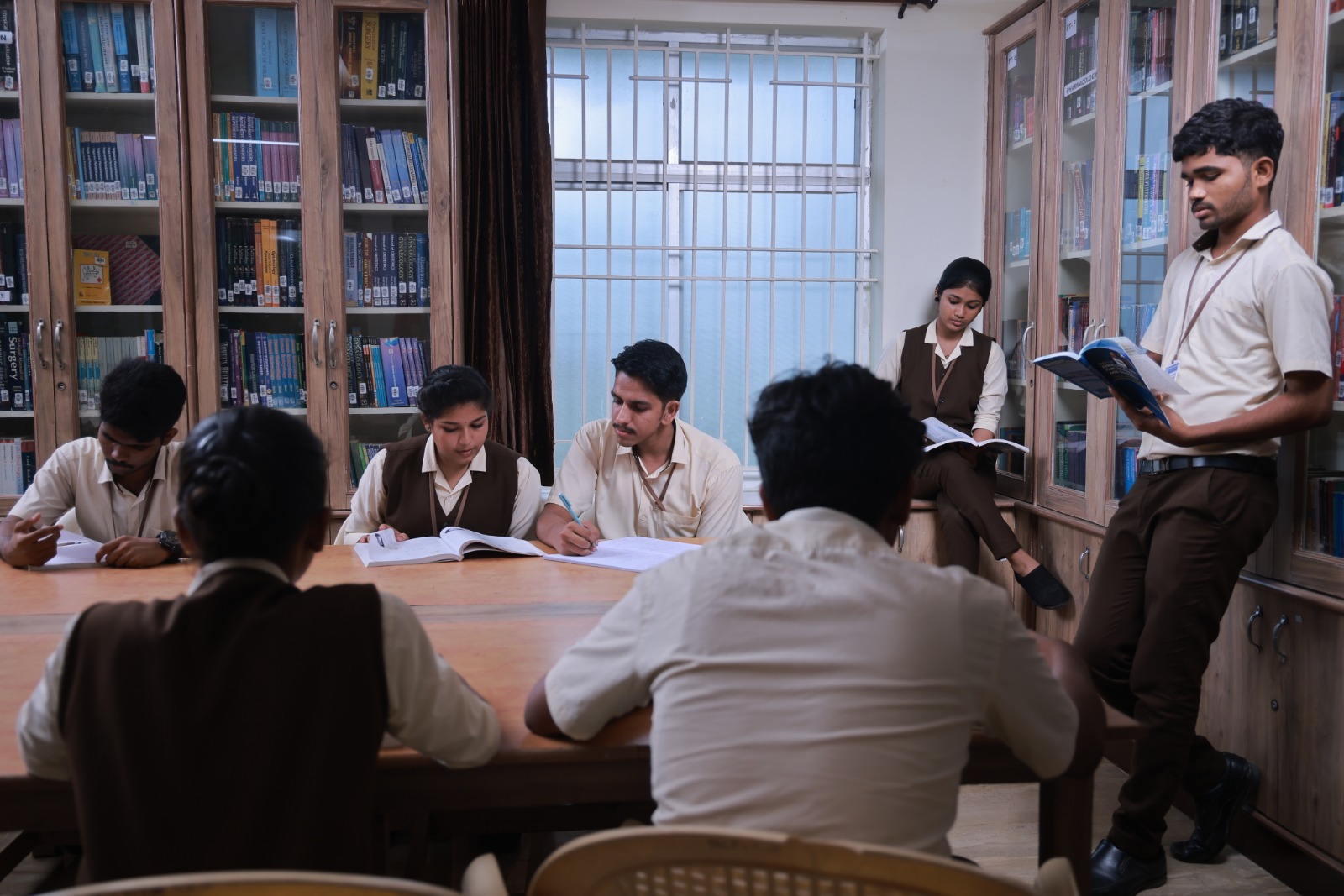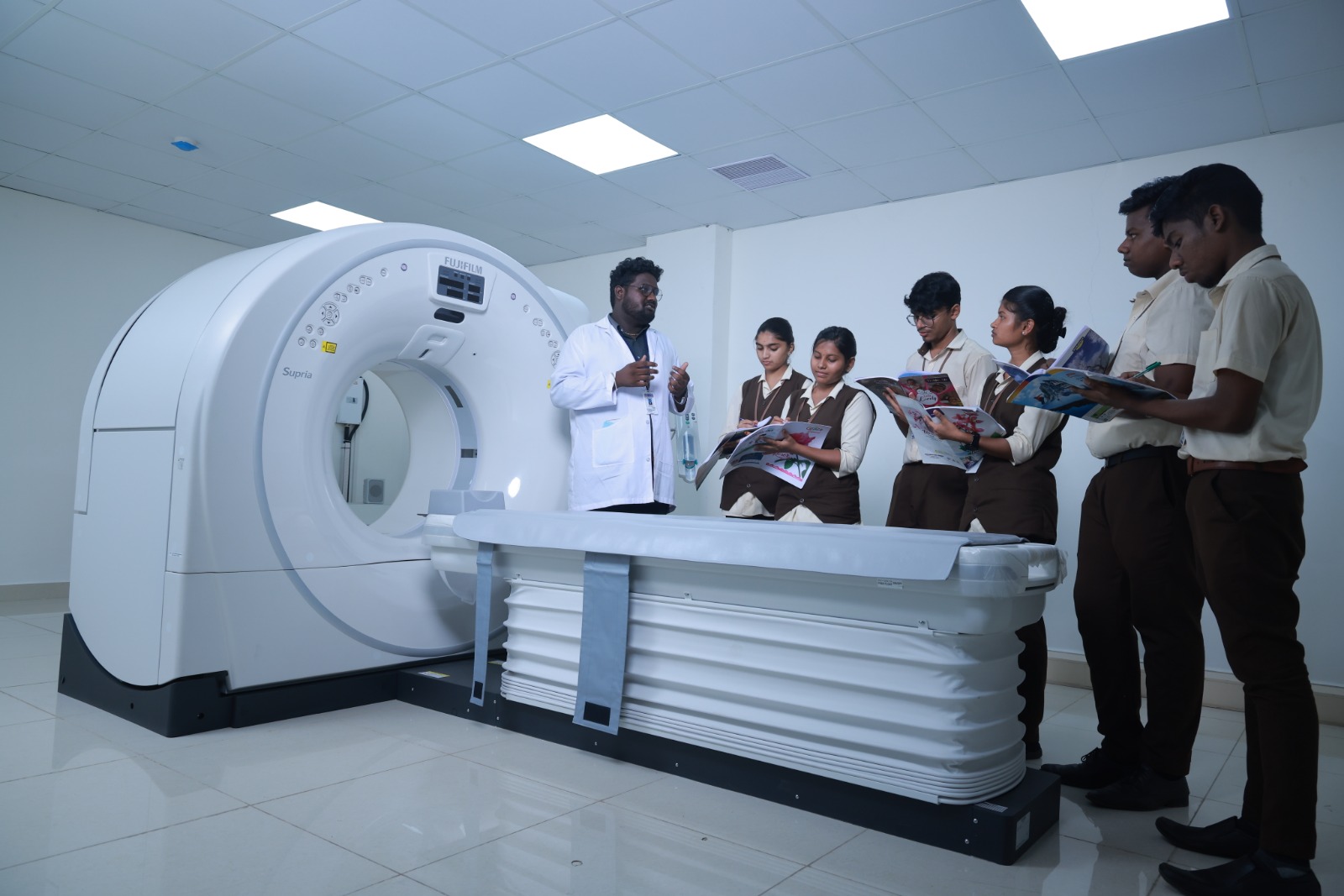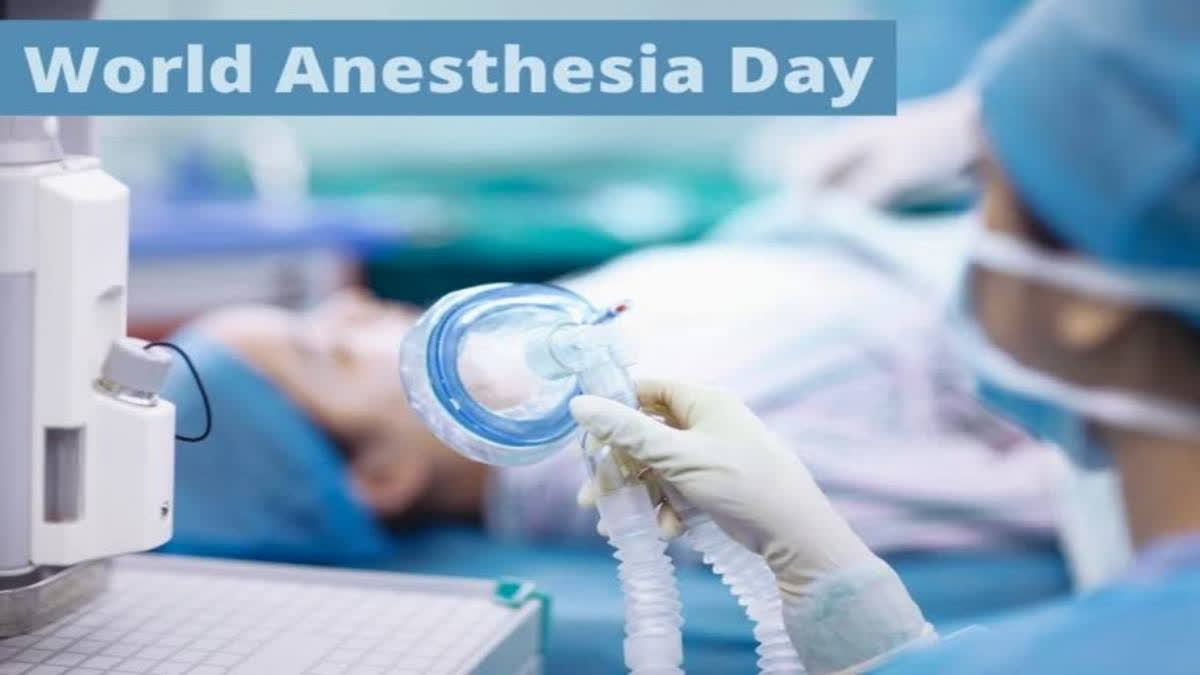- Details
- Written by Super User
- Category: Uncategorised
- Hits: 1217
B.Sc Neuro Electro Physiology
The aim of the undergraduate Neuro Electro Physiology program is to prepare graduates to explore the application of neurophysiological principles in clinical settings and Study the physiological basis and diagnostic approaches for neurological disorders.

On completion of B.Sc. in Neuro Electro Physiology program the graduates will be able to do:
Electrophysiological Techniques: Proficiency in using advanced tools to measure and interpret electrical activities in the nervous system.
Data Analysis: Skills in analyzing complex neurophysiological data to draw meaningful conclusions.
Diagnostic Proficiency: Ability to contribute to the diagnosis and monitoring of neurological disorders.
Research and Innovation: Capability to engage in research and contribute to advancements in neuro electro physiology.
Communication Skills: Effectively conveying complex neurophysiological concepts to both scientific and non-scientific audiences.
Clinical Neurophysiologist: Conducting diagnostic tests to assess and monitor neurological disorders in clinical settings.
Research Scientist: Engaging in cutting-edge research to advance the understanding of neurophysiology.
Neurodiagnostic Technologist: Performing and interpreting diagnostic tests related to neurological function.
Medical Device Specialist: Contributing to the development and testing of medical devices used in neurophysiology.
Academic and Clinical Educator: Teaching and training future professionals in the field of neuro electro physiology.
Electrophysiology course will empower the candidate to carry out and interpret the various neurophysiological tests. Neurophysiological testing is an important component and an extension to the Clinical evaluation in the diagnosis and management of neurological disorders in Children and adults. This includes electroencephalography (EEG), nerve conduction Studies (NCV), evoked potentials, autonomic function tests, transcranial magnetic stimulation, intraoperative monitoring, and polysomnography.
Eligibility
Candidates belonging to all categories for admission to the B.SC. Neuro Electrophysiology should have passed the qualifying examinations after period of 12 years of study with the following subjects of Physics, Chemistry and Biology or Botany and Zoology.
AGE LIMIT FOR ADMISSION
A candidate should have completed the age of 17 years at the time of admission
DURATION : 3 years + 1 year internship
FIRST YEAR
Anatomy, physiology, biochemistry
Basic Nursing And First Aid
Introduction To Computers
Technical Writing/Spoken English Patient Oriented Communication Skill
SECOND YEAR
Electroencephalography And Electronics
Evoked Potential And Clinical Neurology
Biostatistics
THIRD YEAR
Nerve Conduction Studies And Electromyography
Polysomnography, Transcranial Magnetic Stimulation, Autonomic Lab, Intraoperative Monitoring
Application Of Clinical Neurophysiology And Assessment
INTERNSHIP POSTINGS:
B.Sc. Neuro Electrophysiology course Period of Internship:
12 months Posting Duration
1.Routine electroencephalography, video electroencephalography, sleep Lab 6 months
2. Neve conduction & electromyography, autonomic lab, transcranial Magnetic stimulation lab 4 months
- Details
- Written by Super User
- Category: Uncategorised
- Hits: 1273
B.Sc ACCIDENT AND EMERGENCY CARE TECHNOLOGY
The Accident and Emergency Care Technology course is a four-year course which trains candidates in Emergency Medical techniques to become the first responders to all kind of medical emergencies. They are taught knowledge and skills to save the patients with various medical emergencies, within and outside the hospital. Training experience is predominantly in the department of Accident and Emergency Medicine. The Accident and Emergency care trained technicians’ responsibility is to save many precious lives along with medical team with any kind of emergency conditions. On completion of the course, emergency care technicians have good opportunities in multi-specialty hospitals in India and abroad.

Candidates who complete this exciting and challenging programme will be able to handle all kinds of emergency patients in the Trauma / Emergency Departments. Accident & Emergency is an evolving important specialty in India and already established specialty abroad. A dynamic specialty involved in various acute medical and surgical emergencies; this course offers plenty of opportunities for graduates to be employed in emergency services in the following areas
o Government / Private Trauma Centers.
o Emergency Departments in the Multispecialty Hospitals
o Ortho Specialty Centers
o Surgical Emergency Area
o Pediatric Trauma Centers
o Trauma Ambulance Services
o There is a huge demand for trained personnel in Accident and Emergency abroad as well. Sky is the limit for those passionate about emergency care
ELIGIBILITY CRITERIA
Candidates belonging to all categories for admission to the B.SC. Accident and emergency care technology should have passed the qualifying examinations after period of 12 years of study with the following subjects of Physics, Chemistry and Biology or Botany and Zoology.
AGE LIMIT FOR ADMISSION
A candidate should have completed the age of 17 years at the time of admission
DURATION 3 years + 1 year internship
FIRST YEAR
1.Anatomy, physiology, biochemistry
2. Introduction to Emergency medicine (EM) and EMS-1
3.Computer science
4.English
SECOND YEAR
1.Pathology, Microbiology, Pharmacology
2.Patient examination and Nursing
3.Emergency medicine (EM) and EMS II Practical exam on Patient Examination, Nursing, Triage, Life Support, Trauma care
THIRD YEAR
1.Emergency medicine (EM) and EMS III
2.Emergency surgery & Emergency Surgical Services
3.Clinical Procedures and Instrumentation in Emergency Services
INTERNSHIP POSTINGS
- 3 months – Medicine (MICU/ Triage/Lab)
- 3 months – Surgery (Operation Theatre/ CSSD/Laundry/Specialty ICU)
- 3 months – Emergency Medicine
- 3 months – Obstetrics 1 ½ months – Paediatric Emergency and ICU – 1 ½ months
- Details
- Written by Super User
- Category: Uncategorised
- Hits: 1771
B.Sc., Operation Theatre and Anaesthesia Technology

Operation Theatre and anaesthesia technologist is an allied healthcare worker who assists with the administration and monitoring of anaesthesia and has an extensive knowledge of anaesthesia techniques, instruments, supplies, and technology.
Anaesthesia technologists are involved in patient’s care during Peri- operative (The period, Before, during and after the surgery) anaesthetic care, taking into account of the patients’ religious and cultural beliefs and respecting their right to medical privacy and dignity at all times. Anaesthesia Technologists also provide a key role in the emergency resuscitation of patients.
Eligibility
- Candidates belonging to all categories for admission to the B.Sc., Operation Theatre and Anaesthesia Technology Should have passed the qualifying examinations after period of 12 Years of study with the following subjects of Physics, Chemistry and Biology or Botany and Zoology.
Duration :
3 years + 1 year internship
I year
· Basic Sciences – Basic Anatomy, Physiology, Biochemistry and Pathology
· English and Basics of computer science
II year
· Pharmacology and Microbiology
· Medicine and Medical ethics
· Principles of Anaesthesia - I
III year
· Sterilisation procedures
· Principles of Anaesthesia – II
Internship
· Operation theatres (General surgery, Obstetrics and Gynaecology, Paediatrics, Others)
· Post Operative room/Recovery room
· Surgical ICU
· Sterilisation room
Scope :
· As OT technician , assisting surgeons during surgeries
· Sterilizing Operation theatre equipment and ensuring smooth functioning of medical devices
· Work as Anaesthesia technologist, assisting Anaesthesiologists in administering Anaesthesia
· Preparing and monitoring Anaesthesia equipment, assisting with patient positioning and monitoring vital signs during surgery
· Work in Emergency wards and Intensive care units
· Higher education opportunities such as Master’s degrees or specialized certifications in related field
- Details
- Written by Super User
- Category: Uncategorised
- Hits: 1462
Cardiac Technologists assist cardiologists in diagnosing and treating heart problems and ailments. The areas in which training is provided include ECG, Echo, 24-hour ambulatory ECG monitoring (Holter), 24 hour blood pressure monitoring (Ambulatory BP), treadmill, cardiac catheterization laboratory and
electro physiology. Cardiac technologists assist in cardiac catheterizations (Angiogram including balloon angioplasties) and pacemakers. Cardiac
technologists are part of the healthcare team in diagnosing and treating cardio vascular diseases
Duration : 4 years (internship)
Scope : The field of B.Sc. Cardiac Technology opens up a broad spectrum of opportunities, graduates can secure jobs in hospitals, cardiac rehabilitation centers, and diagnostic labs. There are ample opportunities in the medical field. Cardiac Care Technicians can start working at hospitals, clinics, rehabilitation centers, and nursing care centers.
With further training, graduates can specialize in areas like interventional cardiology or electrophysiology. Students can pursue higher studies such as M.Sc, Master of Surgery or MD in the same field. They can also join academics to teach in universities as researchers or teachers. The need for qualified professionals in this field is also expected to grow in coming years.
Eligibility: Candidates belonging to all categories for admission to the B.SC.
Cardiac technology should have passed the qualifying examinations after period of 12 years of study with the following subjects of Physics, Chemistry and Biology or Botany and Zoology.
Course content :
Year I
Paper 1 :Applied anatomy , physiology, biochemistry related to cardiac technology. Paper2 : pathology ,microbiology pharmacology related to cardiac technology.
Paper 3 : Medical Electronic, Biophysics and computer usage relevant to Cardiac Technology Basic Electrocardiography.
Year II
Paper 1 : Clinical features and treatment relevant to cardiac technology
Paper 2 : Advanced ECG and treadmill testing and treadmill exercise stress testing and 24 hours ambulatory ECG and BP recordings
Paper 3 : Echocardiography
Year III
Paper 1 :Cardiac catheterization laboratory Basics Paper 2 :Cardiac catheterization laboratory Advance
Internship: Apart from this, candidates wanting an academic career can enroll in a post-graduate programme in Cardiac Technology and be a “train the trainer” for a satisfying teaching and academic career.
Non communicable disease, especially heart attacks are a major cause of morbidity and mortality not only in India but worldwide. This is the best time to enroll in this programme where the graduates will obtain broad based theoretical knowledge and up-to-date practical training in current Cardiac Clinical Practice. The career opportunities are diverse with a huge choice of employment in the following areas. Cardiology Physician Assistant, Electrocardiography, Tread Mill Stress Testing, 24 hours Ambulatory ECG Monitoring, Cardiac Catheterization Labs, Echo Cardiogram.


















